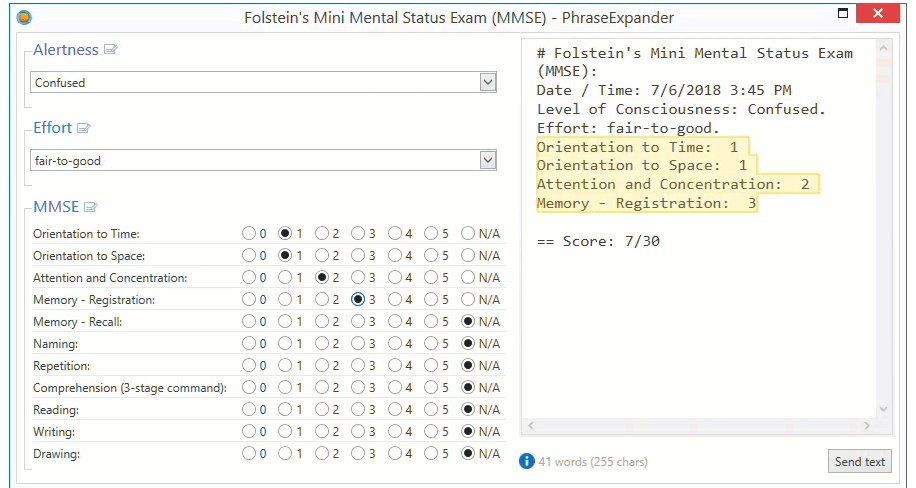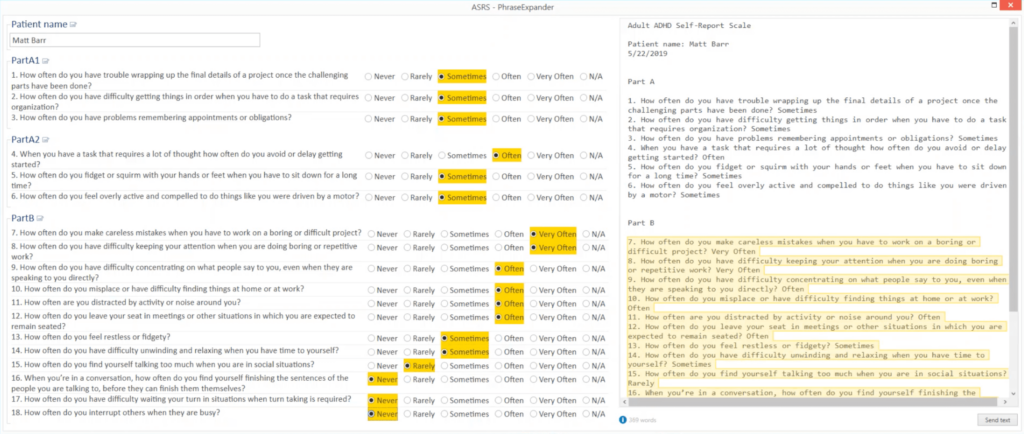After conducting tests and making important observations, the next step is compiling a clear and concise psychological evaluation report. Putting down details you’ve learned about a patient enables clinicians to identify the causes and symptoms of a condition and develop a treatment plan quickly. But writing a meaningful report is not always that easy.
It requires keen observation, active listening, proper organization skills, and well-written and verbal communication. So, how can you develop these skills, save time, and hone your report-writing prowess? Here are tips you can use.
1. Create a Psychological Evaluation Reporting Template
Templates are powerful tools that ensure your reports are accurate, consistent, and free from embarrassing errors that can occur with copying and pasting. Customizable templates let you create structured notes for each patient and eliminate the risk of unintentionally sharing confidential information.
There’s nothing worse than reading a psychological evaluation report about “Mary,” and, halfway through, the same report refers to “Peter.” These kinds of copy-pasting mistakes can lead to a breach of confidentiality rules in psychology. They’ll make you look clumsy and unprofessional.
The best alternative is occasionally using templates and updating to newer versions to reduce errors. You can also use them on any EMR to do examinations and write patient notes. For example, if you want to measure cognitive impairment in a patient, Folstein’s Mini Mental Status Exam (MMS) template will work well for you.
It has a drop-down menu that lets you select the information you need, which saves time and is much better than typing. You can also use templates with other applications like MS Word, your internet browser, or email programs to communicate with patients and colleagues.

2. Collect Accurate Data
Reports should have accurate information that doctors can use to assess a patient’s behavior and give a diagnosis or treatment plan. Part of a psychologist’s work is to collect such reliable information after examining an adult or child and administering tests like:
- Norm-referenced psychological tests to assess intelligence, reading, and processing speed
- Personality tests like MMPI-2
- Projective tests
- Behavioral assessment
- Attitude tests like the Thurstone scale
While conducting these psychological tests, you’ll need reliable data collection tools that let you observe and interpret a patient’s behavior and fill out questionnaires at the same time. The right tools are forms with smart auto-complete features to speed up your typing and improve accuracy.
They suggest phrases or drug names you commonly use in your psychology evaluation. They’ll also help you.
Save Time and Fix Typos
Psychologists collect lots of information during a session with their patients, and writing or typing these details increases the chances of making spelling mistakes. These mistakes can render your reports unusable and make you look unprofessional.
But customized forms are the game changer here. They are designed to make it easy for you to collect data and quickly type error-free notes at the same time.
If there’s a need to type any data, a text expansion feature will give you suggestions for quick access with just a few keystrokes. These forms also have a smart-complete feature that fixes typos and common misspellings to give reports a clean and professional look.
You won’t have to worry about typos or spending hours proofreading reports. Instead, you’ll pay attention to your patients, offer quality services, and quickly collect useful information from the evaluation.

Calculate Scores
Gathering data sometimes requires that you accurately calculate test scores. For example, you’ll need reliable tools to perform a personality test on an individual and know their interests, preferences, and how they respond to situations.
You can also check their mental conditions using a BIMS form (Brief Interview for Mental Status) that tests cognitive impairment and automatically calculates scores. These forms reduce errors with manual calculations and give accurate results that you can include in your reports.
Build Trust and Maintain Eye Contact
Report writing in psychology is a delicate balance between offering the best care and treatment and reporting reliable information. That means psychologists need tools that allow them to write, be observant, and maintain eye contact for some time. It makes them build a stronger connection, create trust, and show compassion.
Patients who feel they can trust you are likely to reveal more details about themselves or their situation. These details are useful in the treatment process and should be part of your report.
3. Interpret Test Results in Your Reports
Rather than just listing test results, write what they say about your patients. For example, after calculating your patient’s BMI score, say if the patient is normal, overweight, or obese, and give recommendations.
Properly interpreting results in your report gives doctors a better understanding of a patient’s condition. They’ll also understand the patient’s behavior and symptoms and give a framework for treating similar problems.
Also, conducting tests and interpreting results requires thorough documentation. You can create customizable forms to standardize your common documents and ensure consistency in the reporting process. Furthermore, you’ll be able to generate custom reports with just a few clicks.
4. Make the Report Concise and Useful
Although you need to write a detailed report that shows what happened throughout a session with your patient, ensure you don’t go overboard. Reduce unnecessary information that can overwhelm readers and make your psychological evaluation reports concise and readable. The reports should include the most important details you present in an easy-to-digest format.
Also, use clear language that others can understand and avoid jargon. A clear and concise report should tell readers what happened throughout the session with your patient. It should also be
- Relevant
- Well-organized with a logical structure and format
- Readable
- Useful
5. Consider Your Readers

Psychologists write reports that different people read. The intended readers can be professionals like other psychologists, clinicians, or doctors. But sometimes, even a patient can end up reading your reports. That’s why it’s important to know your audience and use the most suitable language for them when writing about your findings.
For example, if a patient has to read your psychological evaluation report, avoid strong words like “John is highly narcissistic.” Instead, say, “John overestimates his ability.”
Considering your choice of words makes the reports more friendly to patients and helps build a continued rapport with them. They’ll also be more willing to follow your recommendations. However, if your report is intended for professionals in the same field, like doctors or clinicians, then you can use stronger industry terms.
Include suitable terms in your template’s library for faster typing and reporting. A reporting template with text expansion will use these terms to offer suggestions that are best for your audience. For example, if patients are part of your audience, you can use the reporting template to suggest patient-friendly terms.
6. Tell a Narrative
With all the tests and examinations, it’s easy to find yourself breaking down your report into scores of different tests. That should not be the case. After conducting tests, fix all the pieces back together and tell a narrative about your patient.
The story should tell whether the test results are consistent with the history of the patient and the level of their functional limitation. Write in a way that non-professionals will understand. If there are inconsistencies, describe them in your story.
Write the final information of what you’ve discovered based on all the evidence and test results you’ve received from a session. Let the narration end up with recommendations and what your patient needs to do to get better. Narratives in your reports are easier to remember and help reveal important information.
7. Use PhraseExpander— A Text Expansion Tool for Therapists
Text expansion tools allow you to insert snippets of text by typing an abbreviation.
PhraseExpander is a powerful text expansion tool that lets you set your own templates or use pre-defined templates to create structured notes. These templates have a text expansion feature that works like a cheat code for long, complicated medical terms you need to type in your reports frequently.
With just a few keystrokes, you’ll be rewarded with a longer and harder-to-type medical term without compromising the quality of your psychological evaluation report. Plus, you’ll get your medical notes done more accurately and on time with the Smart-Complete feature to ensure you don’t misspell drug names. It’s a great way to type reports quickly and save time.
Also, you’ll have templates that stay with you wherever you go. If you already have data in Word or Excel, you can import them to PhraseExpander and use them on any EMR or email to attend to your patients or collaborate with colleagues.
Get Started with PhraseExpander
Want to learn what PhraseExpander can do for you? Start your free trial
Conclusion
Writing a psychological evaluation report can be a daunting task. But these tips will help you craft meaningful reports that your colleagues or patients can understand. You’ll be able to correctly calculate data and interpret information so doctors or clinicians can offer the right treatment plan. Non-professionals will also understand your recommendations and follow them.
